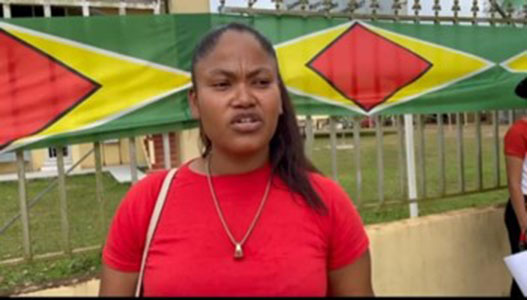By Abigail Headley
Teachers in Mabaruma, Region One have voiced their frustrations over the deplorable conditions of their schools, with inadequate facilities and lack of support from authorities. Last Thursday, during the Guyana Teachers Union’s (GTU) ongoing industrial action, Venus Sharda and Charlene Jeffrey took some time off from protesting for better wages to speak with Stabroek News.
According to Sharda, a teacher at Whitewater Primary, learners are at a disadvantage because of overcrowding. She explained that the school, which was established in March 2007, was initially built to accommodate 150 students. However, it now houses 294 and counting, since enrolment is still ongoing.
“Accommodation there is really bad because we are suffering with the classrooms where all our children are crowded up and we don’t have space to accommodate anybody else, while we are still with enrolment,” she said.

The disgruntled teacher also pointed out that the school’s headmistress is forced to sit and work in the corridors of the building due to overcrowding.
“… In the morning we will go, bring out whatever she needs to use during the day, and [she would] sit on the corridor because there’s no place to go in the school, no accommodation to house her in the building itself. So, we need something to be done,” Sharda said.
She said calls have been made to both the Regional Chairman and the village Toshao but all they have received so far are promises. The Regional Chairman, she said, told the head teacher during a meeting that the school would be given an extension, but “to-date, nothing”.
“On the first day of school for this term, our Toshao for the village went to our school and told us that by the weekend we need[ed] to find [a] place to house the children because a barge is already loaded and the construction would begin, and people will come and move and they don’t want anybody around while they’re working. To date, we did not hear anything,” she lamented, whilst calling for answers as to when exactly the matter would be rectified.
Meanwhile, Jeffrey, who is the headteacher at Hosororo Primary, emphasized the urgent need for additional sanitary facilities and proper assessment of plumbing and electrical systems. She pointed out that with 571 learners, her school only has one washroom for teachers.
“… I have been requesting an additional sanitary block in my annual work plan for about four to five years now, and to date, we continue to suffer. Toilets are not adequate enough for the learners. We have one single washroom for the teachers. [So] you can tell what happens there. I would have also requested several times for those in authority to send someone to take a general assessment of the working condition in terms of the plumbing system and the electrical system. To date, nobody has come to assess those things,” she stated.
The school, which houses primary-top students, is without running water, some lights are dysfunctional, and both learners and teachers alike risk electrocution from exposed electrical sockets. These, the teachers have had to cover with cardboard in an effort to minimize the danger.
“So, the working conditions at Hosororo Primary are not good. I am pleading to those in authority to come and have those issues resolved. It’s too long now. It’s overbearing,” Jeffrey stated.
She pointed out that she and 17 of her teachers were on the protest line that day. The headteacher noted that they refuse to continue working under such dire conditions.
Sharda also added, “Leaders, [and] different persons will [visit] our community and have the residents clapping and going on because they are making these promises, but nothing is fruitful… [so] it’s not just about us demanding an increase, we are all suffering.”
For five days last week, teachers across Guyana went out in their numbers to protest in the streets as their union threw down the gauntlet to the government over its failure to engage in collective bargaining since August 2020. Thus far, the responses from the government have been far from promising as each sectorial leader has insisted that the strike is illegal.
The Ministry of Education (MoE) even went as far as announcing, on the second day of the strike, its intention to discontinue the deduction of dues to be paid to the union. Further, the government has broached the topic of financial audited statements, claiming that the GTU has failed to submit these to the Registrar of Trade Unions for 2 decades. This was later validated by Auditor General Deodat Sharma in a press statement on Friday.
On this note, Opposition Member of Parliament Khemraj Ramjattan has stated that the filing of returns by trade unions annually has fallen into disuse, but it does not impact the validity of the unions, as their certification by the Trade Union Recognition Board under the Trade Union Recognition Act is what legitimizes them.
The criticism of the GTU for this is viewed as a “red herring” and Ramjattan further referenced the case of Nanda Gopaul vs the Guyana Public Service Union, which led to the passing of the Trade Union Recognition Act. This, he noted, provided for union recognition through certification.
The criticism of the union for not filing returns, Ramjattan said, can be seen as an act of mischief on the part of Vice President Bharrat Jagdeo, who can also be criticized for lack of transparency in the handling of his party’s finances. Ramjattan then highlighted the costliness of filing returns and suggested that similar laws such as political parties declaring their spending have also fallen into desuetude. Part two of the 10-day industrial action commences today and the union has vowed that it will continue past the scheduled ending date (February 16) until the government engages with them to negotiate teachers’ salaries and benefits.





